Book contents
- Frontmatter
- Contents
- List of maps
- List of tables
- Preface
- 1 Introduction: staging politics in Kenya
- 2 Shattered silences: political culture and “democracy” in the early 1990s
- 3 Open secrets: everyday forms of domination before 1990
- 4 Moral economy and the quest for wealth in central Kenya since the late nineteenth century
- 5 The dove and the castor nut: Embu household economy in the 1980s
- 6 Conclusions: the showpiece of an hour
- Notes
- Bibliography
- Index
- Titles in the series
6 - Conclusions: the showpiece of an hour
Published online by Cambridge University Press: 05 June 2012
- Frontmatter
- Contents
- List of maps
- List of tables
- Preface
- 1 Introduction: staging politics in Kenya
- 2 Shattered silences: political culture and “democracy” in the early 1990s
- 3 Open secrets: everyday forms of domination before 1990
- 4 Moral economy and the quest for wealth in central Kenya since the late nineteenth century
- 5 The dove and the castor nut: Embu household economy in the 1980s
- 6 Conclusions: the showpiece of an hour
- Notes
- Bibliography
- Index
- Titles in the series
Summary
States have little purchase on society except, literally, what they can purchase.
(Lonsdale 1986: 145)Probably it is a good working rule to be suspicious about political and intellectual leaders who talk mainly about moral virtues; many poor devils are liable to be badly hurt.
(Barrington Moore 1966: 492)“Rain we must and will have” were words Gikuyu speakers shouted again and again during that late nineteenth-century gathering with which I opened this work. The European “caravan people” present during these speeches repeatedly heard pleas for rain during the weeks they traveled through Gikuyu country, negotiating permission from local notables to traverse their territory. At one stopping point, for example, von Hohnel (1968 [1894]: 298) gives the following account:
The chief then went on to impress upon the Count (Teleki) that it would be very foolish of us to attempt to travel in Kikuyuland accompanied only by inexperienced men, but that, as he had heard a good report of us and understood that we would give rain to the land, he would take upon himself the heavy responsibility of seeing us safely through our enterprise. (My emphasis.)
Material well-being (rain, crops, food) are crucial to political accountability. Those nineteenth-century shouts that the Gikuyu needed rain are matched by early 1990s demands for food, jobs, schools, and land. A ruling regime short of funds is as politically vulnerable as were earlier central Kenyan notables short of food.
- Type
- Chapter
- Information
- The Culture of Politics in Modern Kenya , pp. 192 - 200Publisher: Cambridge University PressPrint publication year: 1995

